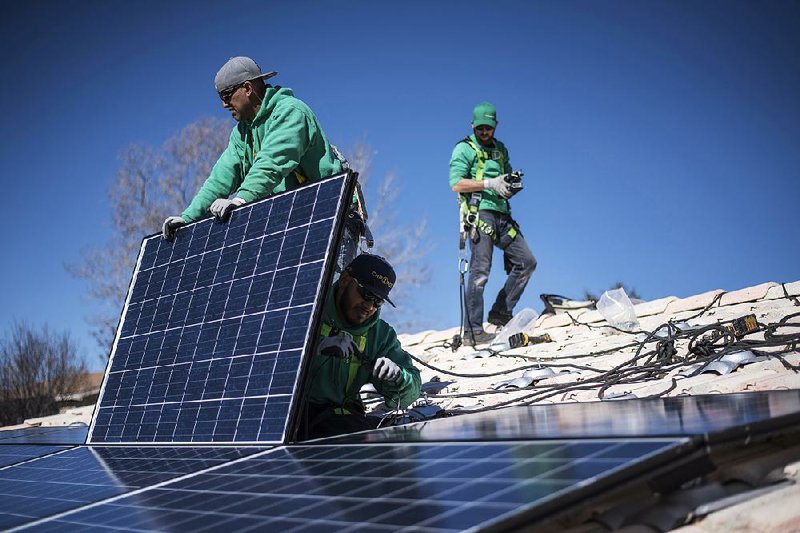The installation of rooftop solar panels, which has surged more than 1,000 percent since 2010, will barely grow at all next year, according to research by Bloomberg New Energy Finance.
Residential installations are expected to increase by 21 percent this year, but in 2017 the figure will inch up by about 0.3 percent. The change comes as utilities push back against mandates to buy the electricity and as shifting tax policies curb demand. Throw in sliding electricity rates and the economic benefits of rooftop panels are no longer so obvious to consumers.
That's forcing rooftop developers including Vivint Solar Inc., Sunrun Inc. and Elon Musk-backed SolarCity Corp. to focus on profitability instead of growth.
"Much like [personal computer] manufacturers in the 1990s, solar installers need to realize substantial new customer sales each year just to tread water in terms of annual revenue," Hugh Bromley, an analyst at Bloomberg New Energy Finance in New York, said in an email.
Residential installations are already slowing from their 79 percent expansion in 2015. Developers are expected to add 2.76 gigawatts this year, and that will inch upward to 2.77 gigawatts in 2017 as investment slips 6.4 percent to $6.8 billion, according to estimates from research and energy analysis group Bloomberg New Energy Finance.
"After growing as much as it has, sustaining a high double-digit growth rate forever is not realistic," said Pavel Molchanov, an analyst at Raymond James Financial Inc. in Houston.
At SolarCity, which pioneered the no-money-down solar leasing model, losses have accrued in 12 out of 15 quarters it has been a publicly traded company even as it tapped into swelling consumer demand. It agreed in August to be acquired by Musk's Tesla Motors Inc. after racking up $3.35 billion in debt to fund growth.
"The trap that residential solar companies have been caught in is trying to get as much market share and volume at all costs," said Angelo Zino, an analyst at S&P Global Market Intelligence in New York. "The winning approach would be focusing on value creation. It's being able to sell your product at a higher price than what it costs to install it."
The rooftop-solar business model is under attack on several fronts. The industry relies on so-called net-metering policies, where consumers sell excess power back to local utilities. As solar gets more popular, utilities are pushing back by attacking net-metering programs in multiple states.
"Every single country that has done solar eventually scales back significantly and reduces its incentives because it has negative consequences on the grid," said Gordon Johnson, an analyst at Axiom Capital Management Inc. in New York.
Another factor figuring into the economics of installing solar panels is declining retail prices for electricity in some markets. And a key reason to install panels evaporated in December when Congress unexpectedly extended a tax credit that has been a key growth driver. It was initially set to expire at the end of this year, but people who had been pushing ahead with projects this year to qualify were suddenly given more time. The move is expected to delay some installations.
"It definitely did slow down growth in the first half of the year," said Jonathan Bass, a spokesman for San Mateo, Calif.-based SolarCity. "We had to readjust and realign our costs with the lower expected volume."
SolarCity -- the biggest U.S. rooftop company, with more than 2 gigawatts of panels installed -- began shifting its strategy in October, two months before Congress acted. Bass said growing consumer interest in solar loans is spurring demand for systems.
To pursue more modest and cheaper growth, SolarCity reduced its installation forecast and said it would focus on reducing costs, acquiring more profitable customers and becoming cash flow positive.
"The strategy of the company has all been about growth," SolarCity chief executive officer Lyndon Rive said in October, while announcing the new direction. "Now that we have achieved scale, we as an executive team and the board have decided to focus on cost reduction and being cash flow positive by the end of 2016." In June, Tesla announced its planned acquisition of SolarCity.
Vivint is also rejiggering its strategy.
As recently as April, with the "distraction" of its failed takeover by SunEdison Inc. finally behind it, Lehi, Utah-based Vivint was again pursuing expansion. That month, it said it expected 12 percent growth this year. By August, a new CEO was plotting a different course.
"I don't subscribe to growth at all costs," interim CEO David Bywater, said in an interview. "I believe every home you install shouldn't be growth at all costs. Driving down the cost curve, that we're being smart where we compete, is our focus."
Vivint will prioritize what Bywater calls "sustainable growth" -- expanding in profitable markets and slowing in others. The company is promoting loans in addition to leases, will co-market products with sister company Vivint Smart Home and is boosting variable pricing.
Sunrun, meanwhile, has been more outwardly devoted to sustainable growth than some of its peers.
In May, Sunrun announced that it will "focus primarily" this year on increasing its net present value to above $1 a watt, a measure of the profitability of its systems, according to its first-quarter earnings report.
"It's really been our strategy all along, sustainability, not growth at all costs," Lynn Jurich, Sunrun's chief executive officer, said in an interview. "It's meant that sometimes when the market is booming, we may play that a little more moderate in order to make more gains."
Business on 09/15/2016
